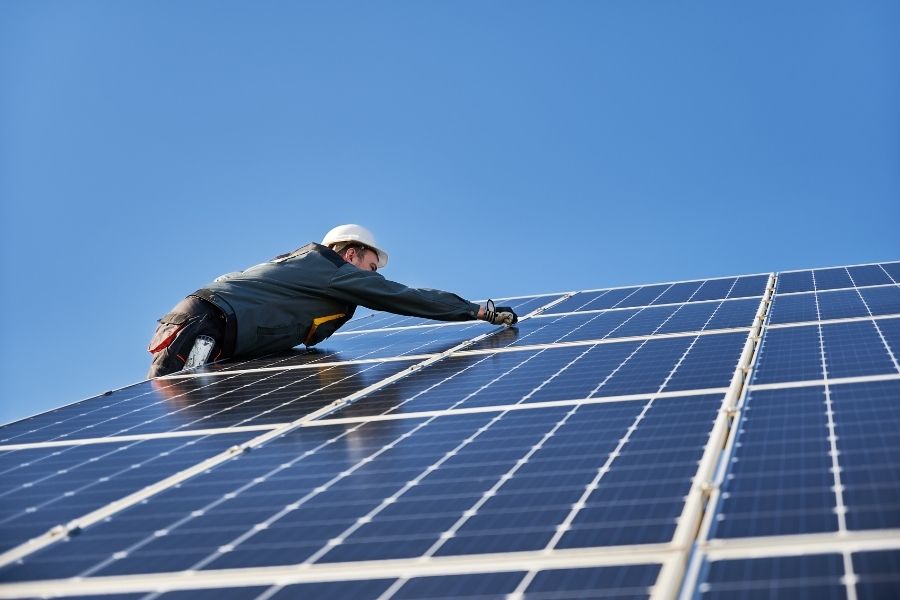What You Need to Consider When Moving To Solar Power
As the old G.I. Joe cartoons always say at the end of each show, “knowing is half the battle”. Before you jump into anything, it’s always good to...
3 min read
![]() Solar Trust Centre Team
:
Oct 25, 2017 9:44:31 PM
Solar Trust Centre Team
:
Oct 25, 2017 9:44:31 PM
Getting power from solar is now becoming the most popular choice around the world and has gone up by 20% every year. In Australia, 1.4 million households already have solar power systems and if you’re thinking about getting one installed on your roof, you need to consider some things before switching.
Take time and check your roof. Some rooves will offer a better return as compared to others. In general, the roof should not be blocked by shade, trees or other buildings. If your roof has lots of angles, ensure that all of them receive sunlight at some point throughout the day.
All solar power systems provide power during the daytime, but without battery storage installed, the system will not be able to provide electricity to use at night. Therefore, considering your energy needs during the day and night. You should be able to estimate the amount you need to power your home and understand the savings you could make in the future.
There are a number of options available that include:
According to a survey made by the Alternative Technology Association (ATA), many households invest between $4,000 and $8,243 after incentives and rebates, depending on the solar power system size. The good news is that there are offers by many solar energy retailers that remove the system purchase cost, which means that the user will only be charged for the solar power generated from the solar PVs on their roof.
There are also government incentives for solar that can help minimise the up-front cost of new solar power systems. The size, location and the certificate cost will vary once the system is installed.
Most Solar PVs have an expected lifespan of 25 years, thus you should go for a trusted solar energy retailer and installer that will be around the lifespan of the solar PVs. Regular maintenance of all the hardware should be looked after by your retailer. Always check the warranty details and make everything clear with your chosen retailer. Always purchase solar power systems that are accredited by the Clean Energy Council. It’s always good to do some research on your chosen retailer.
Download this free brochure from the Facebook page ‘Crap Solar‘ and Solar Trust Centre titled ‘Cheap Solar – A Cautionary Tale’. Learn the signs of cheap solar and don’t fall for a less than quality deal when you purchase a solar system.
If you want to get the full value for your solar power investment, talk to your chosen retailer/provider about your state’s feed-in tariffs (fits) and plans available to you. Every state will have different FiTs and retailers will have different offers, so go to the trusted one and they will give you the best deal for your energy needs. You can contact your state’s Energy and Water Ombudsman for the updated FiT.
Click here to read about the jurisdiction of the Energy and Water Ombudsman Victoria (EWOV) regarding solar power issues. This is just one example as the links for each state energy and water Ombudsman are shown below.
According to the Australian Competition and Consumer Commission (ACCC), a solar provider should not:
Below is the list of agencies you can contact in case of unresolved complaints with a solar provider.
Consumer Affairs and Fair Trading Tasmania
Consumer Protection; Department of Commerce WA
Consumer and Business Services SA
ACT Office of Regulatory Services – Fair Trading and the ICRC
For complaints about your solar account connection, or metering that you could not resolve directly with your energy company or distributor:
Energy &Water Ombudsman NSW (EWON)
Energy &Water Ombudsman Queensland (EWOQ)
Energy &Water Ombudsman Victoria (EWOV)
Energy & Water Ombudsman Western Australia (EWOWA)
Energy &water Ombudsman South Australia (EWOSA)
Some parts of the article were posted on XEN Life, click here to read the full article.
As the old G.I. Joe cartoons always say at the end of each show, “knowing is half the battle”. Before you jump into anything, it’s always good to...
1. Everything you need to know about the Tesla Solar Roof Offer

The process of pursuing a new solar system should be exciting. Yes, there can be some research, phone calls and emails to get through. But ultimately...